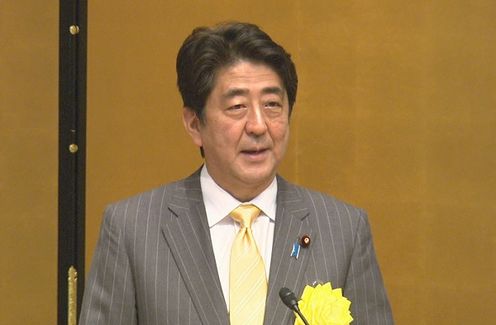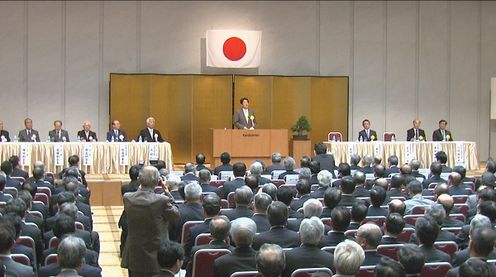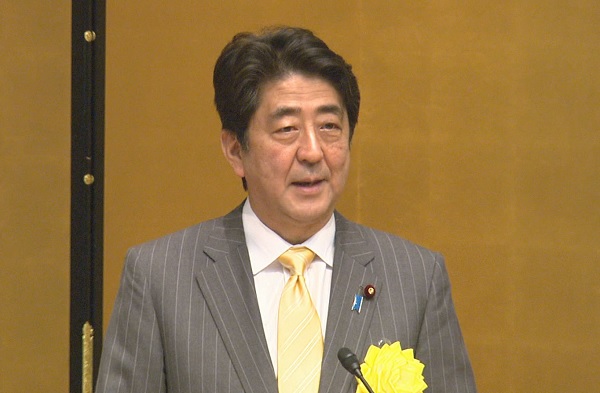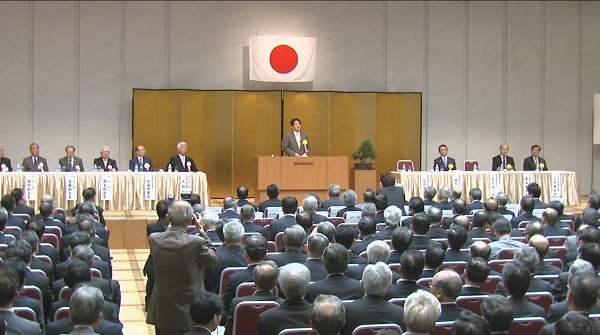Home > News > The Prime Minister in Action > June 2015 > Annual Meeting of the National Association of Shinkin Banks
The Prime Minister in Action
Annual Meeting of the National Association of Shinkin Banks
June 19, 2015

Photograph of the Prime Minister delivering an address (1)

Photograph of the Prime Minister delivering an address (2)
[Provisional Translation]
Prime Minister Shinzo Abe attended the Annual Meeting of the National Association of Shinkin Banks held in Tokyo.
The Prime Minister said in his address,
“I would like to offer a few remarks upon the holding of this annual meeting of the National Association of Shinkin Banks today.
I would like to offer my deepest respect to shinkin banks for the very important role you play in Japan’s economy as dependable financial institutions for each community, achieved through your accurate response to the needs of local small- and medium-sized enterprises and residents, in line with the concept of mutual aid.
Since the change in government, our ‘three arrows’ policy has transformed the economic climate in Japan. The percentage of high school graduates offered jobs is at its highest rate in 23 years, and the current profits of Japan’s corporations are at the highest level of all time. Nominal GDP growth in this year's January to March quarter was 9.4%, the highest level since 1994.
Although initially some were saying that we were only seeing recovery in the cities, we are now finally seeing positive movements all across the country. In each prefecture, the ratio of job offers to job seekers has greatly increased, and tax revenues are rising as well. This year is truly critical to our efforts to accelerate this positive economic cycle that has begun to form and ensure that the winds of economic recovery are fully felt throughout Japan.
Above all, the key to establishing and expanding the positive economic cycle is raising wages. Continuing on from last year, we have once again seen a trend toward increased wages this spring. According to research by the Japanese Trade Union Confederation (JTUC), average monthly salaries, including at small- and medium-sized enterprises (SMEs), have risen by 2.2%, and research by Keidanren shows that summer bonuses too have increased on last year.
Even in terms of companies, some people were of the view that only the major companies in Japan’s cities were recovering. However, since the inauguration of the Abe Cabinet, the diffusion index for business conditions among SMEs has improved by 16 points, while the diffusion index for liquidity has improved by 9 points. Even investments and wages at SMEs, which have been slow to improve, are now starting to rally.
This year marks the starting point for regional vitalization. It is important that we speed up initiatives for regional vitalization through the establishment and implementation of regional versions of the comprehensive strategy, and realize local Abenomics. Improving the earning power of regional companies and industries is indispensable to that end. There are those seeking to foster innovation and create globally leading industries out of the technology and services of the regions, or create brands around products that make use of regional culture and traditional techniques. As these people embark on such challenges, their indispensable partners are you, the shinkin banks, who help develop businesses in close collaboration with the regions.
In my own home region of Yamaguchi Prefecture, a network has been constructed to provide comprehensive support, including consultations on setting up and managing businesses, and technological support, to local companies that are starting new businesses and producing employment opportunities in the regions. This initiative is being supported by local companies, universities, local government and, importantly, regional financial institutions such as Nishi-Chugoku Shinkin Bank. I hope that shinkin banks will serve as a pillar of regional economies; work to strengthen such partnerships between industry, academia, government, and finance; and continue to strongly support regional vitalization.
It is also crucial that we make improvements to productivity and efficiency at regional companies. The service sector in particular accounts for 70% of Japan’s economy and employment. The service sector is an important pillar for regional economies, but increases in the productivity of the service sector have been late in coming. Without the vitalization of the service industry, we cannot hope for sustainable development in the regions. This is truly the key to the success or failure of Abenomics.
Yesterday, we started an all Japan national movement through which the public and private sector will offer finely detailed support from every angle to improve productivity in each field, including the retail industry, food and beverage industry, lodging industry, nursing industry, and transport industry. I strongly hope that the shinkin banks, as important players bearing the responsibility for the regional finances that support SMEs and others, will not simply leave this matter up to businesses themselves, but instead work with SME associations and specialists, and actively participate in the construction of managerial support systems and the smooth provision of capital, thereby making an even greater contribution to the Japanese economy.
Lastly, I would like to close my remarks by sincerely wishing for the further prosperity and development of the National Association of Shinkin Banks, its members, and those in attendance. I ask that you all please join us in our efforts to vitalize regional economies. Thank you.”


